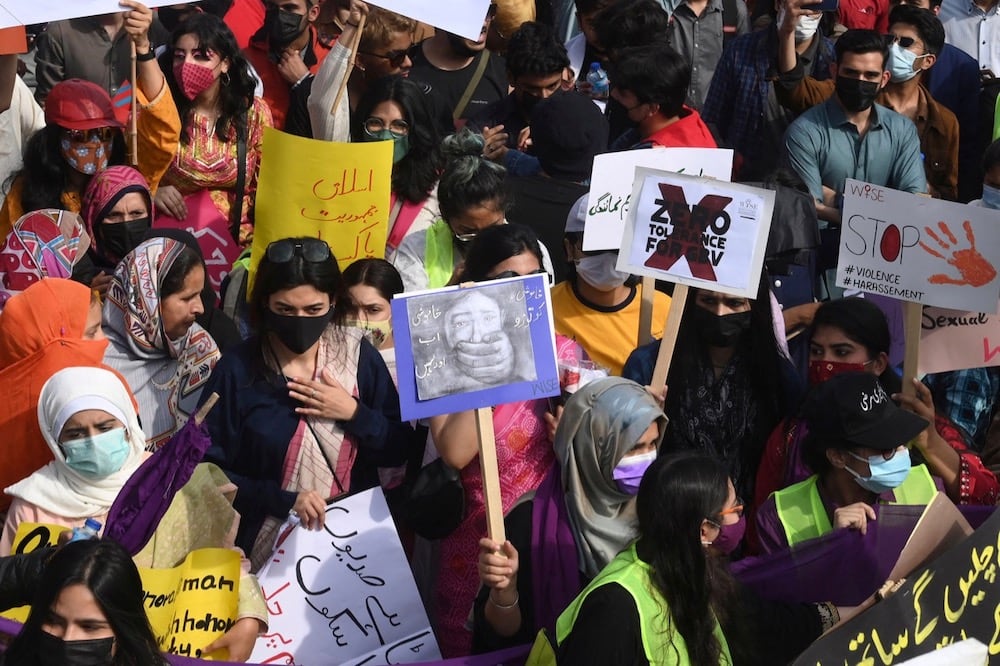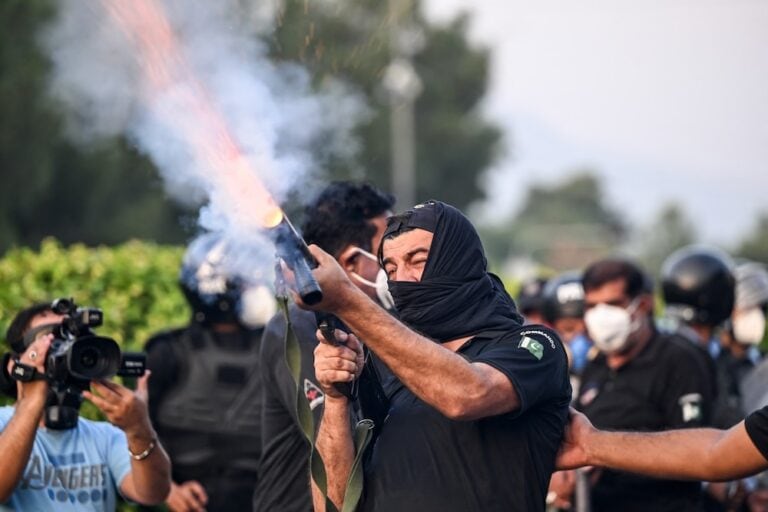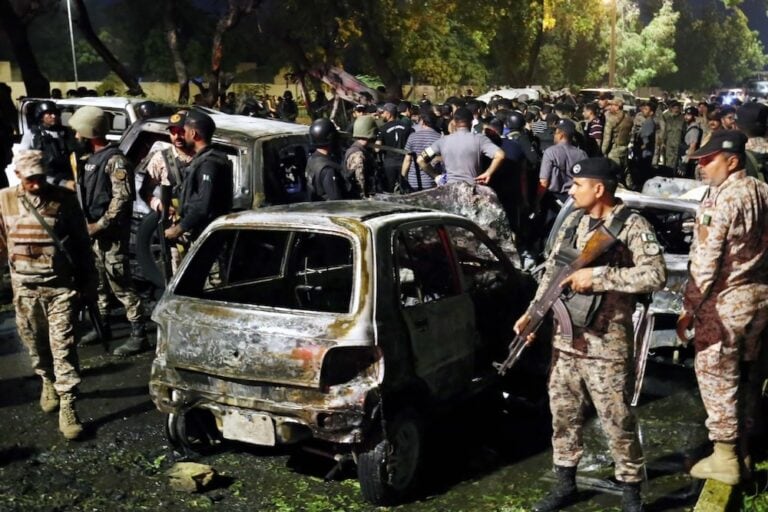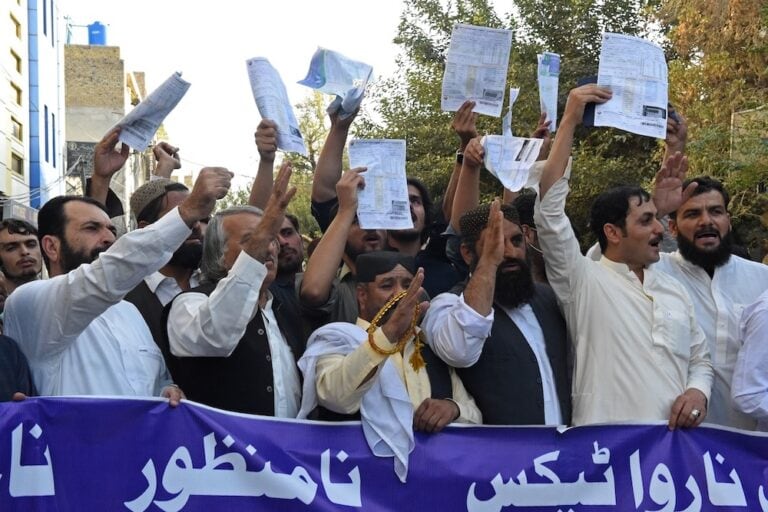While PECA has been used to stifle journalists, it has also been used to intimidate the country’s various marginalised communities.
Journalist Kunwar Khuldune Shahid explores the effects of Pakistan’s Prevention of Electronic Crimes Act on freedom of expression. Amendments to the Act proposed in February 2022, which journalists and legal scholars described as “an affront to online free expression” have now been overruled by the Islamabad High Court after concerted advocacy by civil society groups.
Following the mob killing of Sri Lankan citizen Priyantha Kumara in Sialkot on 3 December 2021, popular Facebook page ‘Rants of a Pakistani Citizen’ posted a typically scathing critique of the vast majority’s refusal to address the blasphemy law. ‘Rants’, as the admin of the page is known among his over 50,000 followers, was not surprised to see the post taken down by Facebook a couple of days later. Many of his posts frequently ‘go against community standards’ on Facebook, or are restricted by the social media platform due to ‘local legal restrictions’.
On Satire
The Rants of a Pakistani Citizen page is known for its no-holds-barred commentary on issues deemed too sensitive in Pakistan. The page’s satire and humour often target Islamic extremism and the military’s totalitarianism in Pakistan. Therefore it did not come as a surprise to Rants that critique of the blasphemy law on his page was mass reported and removed under the garb of ‘local legal restrictions’.
“Facebook often restricts posting for a month if a post does not follow community standards. I’m not sure how it’s decided. My pages have gotten this restriction several times over the years. Some of the posts get restriction just in Pakistan, because of local laws,” Rants says.
The ‘local legal restrictions’ that Facebook cites while taking down posts in Pakistan allude to the Prevention of Electronic Crimes Act (PECA) 2016, the country’s cybercrime law. While Facebook began compliance with Pakistani regulations in the aftermath of PECA’s passage into law a little over five years ago, the censorship of ‘unlawful content’ on social media was formalised by the Removal and Blocking of Unlawful Online Content (Procedure, Oversight and Safeguards) Rules 2020, drafted under PECA. The rules maintain that ‘subject to the provisions of PECA,’ licensees that provide social media or social network services would be bound to remove content that breaches Pakistani law.
As underlined in Section 37(1) of PECA, which empowers the authority to regulate online content, the restrictions imposed on online speech include content that is against the “glory of Islam, security of Pakistan, public order, decency and morality and; integrity and defence of Pakistan.” These categories are sufficiently broad and vague to target anything that might challenge the status quo, which the state, via PECA, can then arbitrarily dub ‘unlawful’.
An attempt to make PECA further restrictive was made via a presidential ordinance passed on 18 February 2022, expanding on section 20, which criminalises defamation in the country. The ordinance would have extended the protection to government authorities and departments; anyone found guilty of spreading ‘fake news’ or defaming government departments and officials could be arrested on a non-bailable arrest warrant and sentenced to five years in prison. The ordinance was declared unconstitutional by the Islamabad High Court last week.
Following the election of the new Pakistan Muslim League-Nawaz (PML-N) led government this month, the incumbent information minister has vowed to review PECA, but critics worry that the law’s utility as a totalitarian tool might not be undone, especially since it was the previous PML-N government that passed the original, much criticised, law.
The Pakistan Federal Union of Journalists (PFUJ) has regularly condemned PECA clauses, and in February challenged the latest ordinance in Islamabad High Court through a petition that stated, “the government intends to muzzle the media.” Critics maintain that PECA has violated the freedom of speech guaranteed in Article 19 of Pakistan’s constitution. They believe, even under the new regime, the law can continue being used to suppress the media and further squeeze free speech on the internet, pushing social media giants to be party to the Pakistani state’s censorship. And Rants of a Pakistani Citizen has witnessed first-hand how Facebook allows the Pakistani state to exercise its highhandedness under the garb of ‘preventing electronic crimes.
A post on the Rants of a Pakistani Citizen Facebook page from 11 October 2021 read, “I think Tiger Force and Rahmat-ul-almeen authority will revolutionise the future of Pakistan. Imran Khan is truly a genius (sic).” The post, a satirical jibe at the government’s merger of gullible volunteers and Islamic populism, was taken down by Facebook with a ban placed on the page preventing it from going live or advertising for 30 days.
“I couldn’t figure out why such a post would get flagged, because it is not blasphemous, so usually people wouldn’t report it. But assuming someone did, Facebook usually tends to ban anything [reported on the page that is] not in English,” Rants adds. Facebook’s ability to moderate content outside of English, and other widely spoken European languages, is significantly hindered by the lack of people moderating the content posted in other languages, including Urdu.
Rants is among the many dissenting Facebook page owners who criticise the social media giant for helping totalitarian states implement their restrictive rules in order to protect its business. The stance of many of these critics is vindicated by numerous tech companies registering with the Pakistan Telecommunication Authority (PTA) in accordance with the social media rules. The PTA banning and then lifting the ban on Bigo Live, Snack Video, and Likee, after their agreeing to the government’s terms and signing up to the Removal and Blocking of Unlawful Online Content (Procedure, Oversight and Safeguards) Rules, vindicates the scepticism. Satirists like Rants insist that if Facebook needs to suppress satire or free speech that asks the state uncomfortable questions, the social media platform would gladly do so without blinking an eye.
“I think Facebook does not care much about satire, they see pages as businesses trying to reach customers. They don’t care much about the type of content as long as nobody is reporting content, and after that, if it’s not a very popular page, they would let algorithms handle it. Sometimes they also [removed] posts [that] actually did not violate community standards but were just heavily reported,” he says.
“As far as Pakistani authorities are concerned,” Rants says, “maybe the satire is lost on them, but they for sure do not like it.”
On Digital Media
Five months after PECA was passed, in August 2016, a few dissenting activists and secular bloggers were abducted owing to the content they posted online. The activists have accused the state of being responsible for those abductions, forcing all of them into exile. The action against the bloggers, and the air of intimidation it created for state critics, turned out to be an effective crackdown on digital anonymity. This was followed by the courts equating content that breaches PECA with ‘terrorism’ and demands that social media be banned altogether if the digital platforms do not comply with Pakistani laws.
In June 2017, Pakistan issued its first death sentence for cybercrime.
While the state had initiated action against citizens over digital content, passing PECA into law also allowed it to increase its hold over mainstream media. By 2016 not only did all media houses have a substantial digital presence – including news websites, social media pages and YouTube accounts for TV channels – alternative media was also growing, parallel to the mainstream. With TV channels and newspapers already under scrutiny, now digital media, including the personal accounts of journalists, were being monitored as well.
In June 2017, Daily Qudrat reporter Zafarullah Achakzai was arrested in Quetta, under PECA. Since then, 23 journalists have been targeted by the cybercrime law, according to the Freedom Network’s report published in 2021 on the International Day to End Impunity for Crimes Against Journalists.
Among the prominent investigative journalists targeted under PECA is Shahzeb Jillani, who in April 2019 was accused by the Federal Investigative Agency (FIA) of ‘cyber terrorism’. Jillani was charged with uttering “defamatory remarks against the respected institutions of Pakistan,” and action against him came just days after he took part in a television broadcast on Pakistan’s missing persons.
Even before the FIA took formal action against Jillani, he could tell that something was brewing, since he, like so many journalists who question the state’s policies in the country, had become a target of online campaigns designed to malign him.
“The pressure had been building for a few months, as scurrilous trolling on Twitter [became] more intense and serious. It was clearly orchestrated, as most of the accounts abusing and attacking journalists like me had a picture of the Pakistani flag, a numeric Twitter handle with usually less than a few dozen followers,” Jillani recalls. He is referring to troll farms, which have been found to orchestrate organised campaigns against those challenging the state narrative.
“I made a dozen or so court appearances. As a defendant out on bail, I had to be on time at every hearing, but the prosecution would often fail to show. I was told that this could drag on for months. The case against me was eventually thrown out of court. I consider myself incredibly lucky to have survived an insidious law aimed at silencing journalists,” Jillani adds.
On Marginalised Communities
While PECA has been used to stifle journalists, it has also been used to intimidate the country’s various marginalised communities. Members of many of these vulnerable populations believe that PECA – a law in essence designed to safeguard the digital rights of the entire population of the country – is actually emboldening those atop the power structures.
While the state has been quick to ensure that social media giants like Facebook and Twitter comply with local laws to take down any content arbitrarily deemed ‘inappropriate’, it is not uncommon to see trends and even entire campaigns being run on these platforms that target voices that are already being pushed to the periphery.
For instance, women activists and journalists face threats of sexual violence and other forms of intimidation, some of which organisations like Reporters Without Borders have linked to the government itself. The annual Aurat March on Women’s Day is often the target of Islamist and misogynistic vitriol, with last year’s rally attacked with fabricated videos and images, which were widely shared by the many detractors of the movement, without any tangible state action against them by the state or social media companies.
Where women are often victims of online attacks, minorities, both ethnic and religious, are extremely vulnerable as well. Members of ethnic communities, such as Baloch, Sindhis or Pashtun, are frequently attacked regardless of whether they are espousing nationalist narratives or simply challenging majoritarianism in the country.
Pashtun nationalists, who had protested against the state’s policies in the tribal areas and the denial of rights to the locals, came together as the Pashtun Tahaffuz Movement (PTM) in 2018. What was designed as a vehicle for the locals to highlight the many abuses they were facing became a nationwide movement, which the state took little time clamping down on. In addition to state violence and a blanket ban on mainstream media, the crackdown on PTM extended to the digital realm.
Where social media had provided a platform for the Pashtun to demand the many rights they felt they had been deprived of, PECA allowed the state to then arrest PTM supporters and members, including the movement’s chief Manzoor Pashteen, over allegations of cybercrimes. This meant that many of the Pashtun nationalists, which were still protesting against the lack of internet in the former Federally Administered Tribal Areas (FATA), were charged with committing crimes online, even as they were merely demanding the rights afforded to the rest of the country.
Latif Wazeer, a PTM worker from Jani Khel town of Bannu division, has been participating in various rallies demanding internet and other rights in the former FATA. Wazeer was named by FIA in a 2019 list of PTM workers charged with cybercrime.
“My Twitter handle was among those listed by the FIA. However, the case is still pending. I feel these cybercrime laws are used by the state to silence democratic voices like ours, who are just demanding our constitutional rights,” he says.
“Given the blanket ban on coverage for PTM in mainstream media, social media has been an important outlet for our movement. But laws [such as PECA] are designed to take away even that outlet from us. This is not just a concern for Pashtuns, but all marginalised communities, and the future of democracy in Pakistan,” Wazeer adds.
In addition to ethnic minorities, religious minorities have also become increasingly vulnerable to PECA given that it has essentially taken Pakistan’s blasphemy law into the digital spheres. With Section 295-C of the Pakistan Penal Code establishing the death penalty for blasphemy against Islam, PECA is now being used to send individuals to the gallows for anything that is perceived as sacrilegious. The government has even asked Facebook and Twitter to help identify blasphemers on their platform, in addition to regularly warning cell phone users across the country of the perils of blasphemy via text messages sent by the PTA.
Multan-based academic Junaid Hafeez, already in prison since 2013, was sentenced to death in 2019 on charges that also included sections of PECA. Christian couple Shagufta Kausar and Shafqat Emmanuel, among dozens charged with blasphemy for digital content, were on death row since 2014, only acquitted last year following the European Union’s resolution against the Pakistani laws that had victimised the couple. Last month, a woman was sentenced to death over ‘WhatsApp activity’ under PECA.
But, like the blasphemy law that it has co-opted, where PECA can be used as an aide to penalise users with capital punishment under the Pakistan Penal Code, the greater menace comes when vigilantes take the law into their own hands. Mashal Khan, a student at Mardan’s Abdul Wali Khan University was lynched over content he posted online in 2017. Another man, Tahir Ahmad Naseem, was killed in court in 2020 while on trial for alleged blasphemy committed online.
Among the most vulnerable to mob violence over digital content are the members of the local Ahmadiyya community. In 2014, an Islamist mob burned down an Ahmadi locality in Gujranwala, burning a woman and her two young granddaughters alive over a Facebook post. Many Ahmadis have been sentenced to death for blasphemy by the state, including for social media activity.
Aamir Mehmood, a spokesperson for the Ahmaddiya community says, “As far as the Ahmadiyya community is concerned, not only does [PECA] not protect [Ahmadis] but actually aids in the persecution of the community. In [the] last three years, dozens of Ahmadis were booked under Pakistan’s cyber laws and hate speech laws. In addition to this, these Ahmadis are also exposed to death penalty under Pakistan’s blasphemy laws. Unfortunately, cybercrime laws [that criminalise online hate speech] do not account for hate speech against Ahmadis but actually promote hate speech against Ahmadis.”
For Ahmadis, PECA has only aggravated the marginalisation that Pakistan’s Constitution and Penal Code uphold against the community. As a result, the frequent hate speech and social media trends against Ahmadis quite often are found merely echoing what is law in Pakistan.
Ahmadi social media users maintain that changes to PECA need to be implemented to address the bigoted clauses of the Constitution. These include the second amendment to the Constitution, and Ordinance XX of the Penal Code, which deny the Ahmadis their right to self-identification.
“These laws not only violate Ahmadis’ right to profess, preach and practice their faith, but also have endangered their lives. The basis of any working society is that it truly represents its community, therefore discriminatory electoral laws against Ahmadis need to be done away with,” adds Aamir Mehmood.
Instead of addressing these legal lacunae, the Pakistani state has continued to double down on the laws used to persecute the already persecuted.
Need for inclusive policies
Indeed, instead of fixing the flaws pointed out in the cybercrime legislations that hinder free speech in the country, the government followed up with plans to establish the Pakistan Media Regulatory Authority (PMRA) – slammed by activists and journalists as the state’s attempt to further entrench its overreach into individuals’ digital rights and on the media – and the social media rules passed last year.
Rights groups, activists, and analysts continue to reiterate that the government’s digital policy needs to incorporate safeguards for the groups that are most frequently targeted online.
Remshay Ahmed, the communication and advocacy officer at Innovation For Change, says, “In 2021, Pakistan introduced its first digital policy. However, it needs to be inclusive in order to be effective. It doesn’t provide the safety nets to minority groups and marginalised communities that it should.”
“As for the law, there needs to be a constructive conversation, led by digital rights fora, on the need for protecting and enhancing freedom of speech and the regulatory mechanisms that are required to protect the rights of [civil society organisations], journalists, activists, and human rights defenders, as civic space in the country remains repressed,” she adds.
PECA, which at its conception stage was lauded for establishing online harassment and other cybercrimes as punishable offences, is now providing shelter to those crimes, especially when committed to shield the state or the government’s vested interests.
As a result, freedom of speech, which had already traversed turbulence throughout Pakistan’s legal history, received a major blow following PECA’s enactment without ensuring that all communities in the country have equal access to the rights enshrined in the Constitution.
With the PML-N government in-charge it has the opportunity to review not just the amendments, but the law itself that the party had originally brought five years ago. Failing to do that will only result in further draconian legislations emboldening the country’s plunge into totalitarianism, with due compliance from global social media giants.



